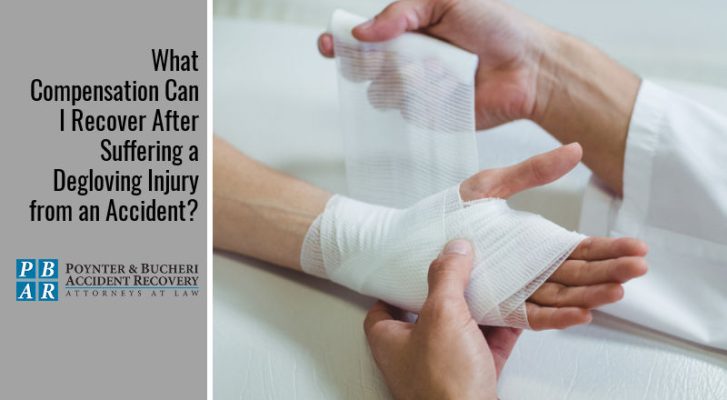
What Compensation Can I Recover After Suffering a Degloving Injury from an Accident?

Although many people are unfamiliar with a degloving injury, they can be highly dangerous and may even cause death. Degloving injuries may require extensive surgeries, including skin grafts, as well as continuing treatment to prevent infection. You could also face permanent disabilities that prohibit you from working.
Medical expenses can quickly add up, and you shouldn’t have to worry about covering these costs yourself. If you suffer from a degloving injury from a traffic accident that someone else caused, you need to file a claim in order to recover compensation.
What Is a Degloving Injury?
A degloving injury refers to when a victim suffers from intense and painful tissue damage in an accident. Although the term for this injury makes it sound as if it’s only referring to the hands, a person can suffer from a degloving injury anywhere. There are two main types of degloving injuries:
- Open degloving injury: This means that the victim’s skin peeled away, leaving an open wound. The accident may tear the skin or leave a flap that remains connected to the victim’s body. Open degloving injuries typically require skin grafts, and the most commonly affected areas are the face, scalp, and legs.
- Closed degloving injury: This means that the victim suffered extreme force or trauma that results in a gap between their different layers of flesh. The blood vessels break, but the skin doesn’t tear like with open degloving injuries. Different liquids may fill the gap between the skin layers, including fat, blood, and lymphatic fluid. Due to the disconnection between the top layer of the skin and the tissue underneath, the skin may die and become loose. Treatment for a closed degloving injury typically involves doctors compressing the skin layers in order for them to heal. Doctors may also drain the fluid between the skin layers or cut off dead skin. The most commonly affected areas include the hips and knees.
Degloving Side Effects
Degloving can result in severe side effects that may impact you for the rest of your life. These include:
- Nerve Damage: If you’re able to recover the skin after a closed or open degloving injury, you may still have permanent nerve damage to the affected skin. This may come in the form of numbness, tingling, lack of dexterity, and pain.
- Tissue Death: An open or closed degloving injury can result in tissue death because the blood vessels get cut off from the affected skin. Even if doctors successfully reattach or compress the skin, you may have tissue death because the skin was cut off from oxygen and nutrients.
- Infection: Infection is common after experiencing an open degloving injury. Bacteria may enter the open wound and multiply, causing an infection. The infection can cause tissue death, and it could enter your bloodstream, resulting in sepsis.
- Scars: Those with damaged tissue may develop scars due to their replacement cells. If you require a skin graft, your chances of having permanent scars increases.
- Amputation: Tragically, some that experience severe degloving injuries may have to undergo an amputation. Doctors may recommend amputation if the skin, nerves, and blood vessels are too damaged to heal.
Recovering Damages After a Degloving Injury
If you suffer from an open or closed degloving injury after a car accident, you need to recover the compensation you deserve to pay for your medical bills and other expenses related to your injuries. Motorcycle accident degloving injuries and pedestrian accident degloving injuries can be especially severe because pedestrians and bikers lack sufficient protection if they’re struck by a driver.
Some of the damages you may be able to recover include:
- Medical bills
- Property damage
- Lost wages
- Loss of future earnings
- Disabilities
- Disfigurement
- Pain and suffering
What If I’m Partially At Fault?
Indiana uses a modified comparative negligence system in personal injury cases. Comparative negligence means that both parties may be partially at fault, but you can still recover compensation. For example, if you jaywalk and a drunk driver hits you, you might both be found partially liable for the accident. The drunk driver may receive 60% of the liability for being under the influence of alcohol while you’re 40% liable for breaking pedestrian laws. In this case, you can still recover damages from the drunk driver, but the amount of compensation you can receive will be 40% less due to your role in the accident.
The modified comparative negligence system in Indiana states that you cannot recover compensation if you’re 51% or more liable for the accident. If you experience a degloving injury and you’re found 55% at fault, you will not be able to recover damages in a personal injury case.
Get Legal Support After a Degloving Injury in Indiana
If you file a personal injury claim against someone after suffering from a car accident degloving injury, you need seasoned legal assistance to help you prove your case. For Indiana car accident lawyers you can count on, contact the legal professionals at Poynter & Bucheri Accident Recovery Attorneys at Law. Call us today at 1-800-265-9881, or you can schedule a free case review here.
